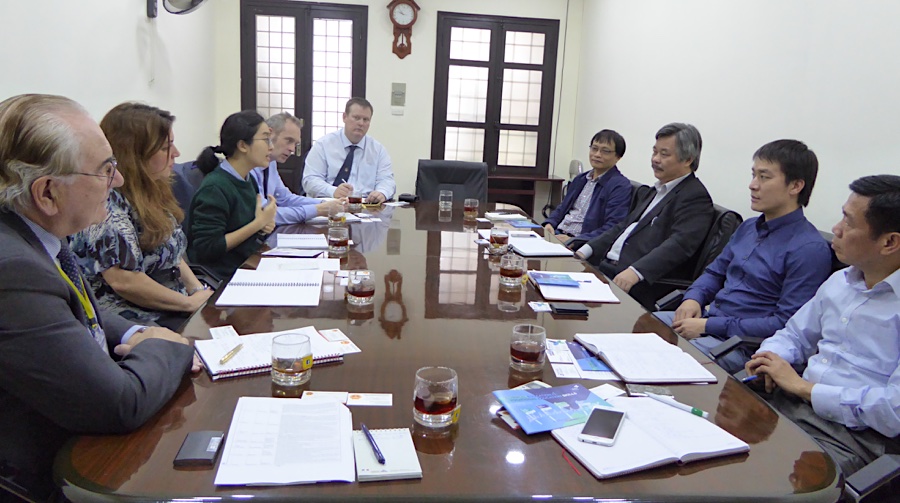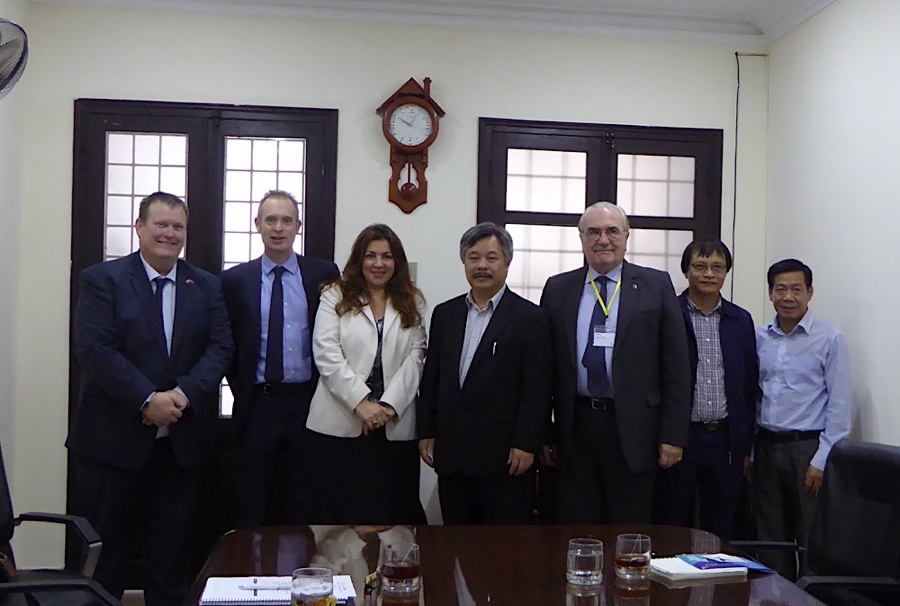In partnership with UK Skills Federation, Semta International and Institute of the Motor Industry (IMI), Global Skills Ledger’s CEO, Jonathan Ledger spent the week of Monday 27th to Thursday 30th March 2017 in Vietnam promoting the UK’s world-class Technical and Vocational Education and Training sector and to speak at the Department for International Trade’s ‘Excellence in Education’ workshop.
During the week, Global Skills Ledger and Sector Skills Council colleagues met with Government Ministry officials, stakeholders, donor organisations such as Asian Development Bank and World Bank and a raft of local colleges, universities and other key agencies in order to hear about the strategic direction and activity regarding the Vietnamese education reforms that are currently underway. This allowed the UK partners to demonstrate how their extensive skills knowledge and experience could be utilised to support the Vietnamese reform of their technical and vocational education and training (TVET) system, so that it is fit for the 21st century and beyond.
Enabling a better understanding on how the UK skills system, in all its forms, helps nations to achieve their emerging aims and ambitions – which is something that Global Skills Ledger’s experts excel at every time!

A key pillar of the Vietnamese TVET reform is the development of Sector Skills Bodies. These will act as a driver of employer engagement so that national skills standards, related curriculum and high quality training delivery is targeted at those roles where skill shortages or vacancies exist – both now and in the future – and that the training provision system is totally demand orientated. As part of the development of the Vietnamese National Qualifications Framework, there is a strong ambition to ensure that all academic and TVET qualifications are recognised across the ASEAN Region and further afield internationally. Traditionally, TVET qualifications have not been developed or seen as socially acceptable in Vietnam and so Government Ministers hope that these reforms will bring about the tide of change that Vietnam needs in the future.
“Some Vietnamese industries, such as textiles and garments, currently employ large numbers of low skilled workers. As mechanisation and automation takes hold, 90% of these workers will no longer be required in these jobs and so a robust programme of re-training and upskilling must start now.” said Jonathan Ledger, CEO of Global Skills Ledger.
“It is really great to hear that the award-winning skills work we completed with the Viglacera Corporation is being used as a framework that other industries can utilise. This demonstrates that bringing a contextualised approach from the UK really can work, as long as it is delivered in a way that is best suited to the Vietnamese requirements.” Said Ledger.
On Tuesday evening, there was a networking event hosted by the UK Ambassador to Vietnam, His Excellency Giles Lever at his official Hanoi residence. This afforded the delegation an opportunity to meet with a wider range of TVET and education related officials and stakeholders from both the UK and Vietnam. It also allowed UK partners the chance to better understand the political, economic and social context in which the Vietnamese system needs to operate.
The UK is seen as a world leader in TVET development and implementation. The level of expertise and experience that the UK offers is unparallelled in so many ways. Not least, because of the historic length of time that TVET has been operating in the UK – which is well over a century and some! In those early pioneering days, it was an ‘indentured apprenticeship’ overseen by long-standing Livery Companies. Now, apprenticeships are open to all young people in almost any job they like.
Over time, the UK approach to TVET has continually evolved to fit the economic and social circumstance of the UK. The current emphasis is on ensuring that employers have control of the skills system and that they actively use their leverage to shape and deliver the skills and competence that their workforce needs today and into the future and it is precisely these lessons and expertise that is being shared with Vietnamese counterparts.
In support of this employer-led approach, the UK continues to make use of apprenticeships and vocational qualifications as the underpinning foundation to workplace technical education. In fact, the UK is one of the few countries in the world who have an education system where academic and vocational qualifications sit so happily alongside each other – a system which Vietnam is hoping to create for themselves.

Just as with any other industry, the UK TVET sector is able to take advantage of the extensive export opportunities that a global market offers. TVET and education is one of the few UK exports that invariably have to be contextualised to fit the importing country. Direct importation of the UK skills system, without this harmonisation and contextualisation, would lead to failure and lack of ownership.
The development of another country’s skills system does not provide competition to the UK in the way that you might think – many are not as advanced as the UK and are many years behind. More importantly, it does however, provide countries with a robust and high quality skills framework that enables workers to get themselves out of poverty; it enables social mobility; and just as in the UK, TVET allows all walks of life, the fantastic opportunity to develop their skills, knowledge and competence for entry into the labour market and to sustain employment for the long term.
Contact us for more information about how Global Skills Ledger can support your skills development needs.
UK Skills Federation represents the Federation for Industry Sector Skills & Standards and its members, the UK Sector Skills Councils and National Skills Academies. It’s role is to promote UK expertise in the development of programmes to support technical and vocational education and training around the world.

